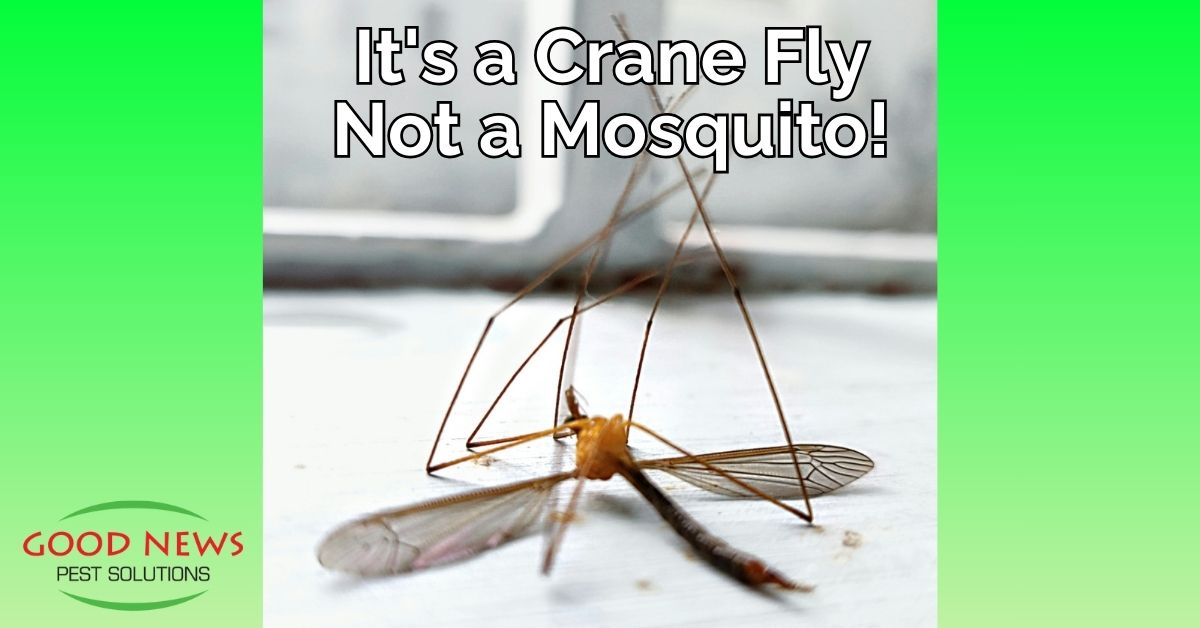
It's a Crane Fly – Not a Mosquito!
Scientists tell us they’ve counted more than 1 million species of insects in the world – and they estimate, on average, another 6 million we just haven’t spotted yet. Florida alone is host to at least 1200 different insect species, so any confusion or accidental misidentification is entirely understandable.
All the more reason to pause for a moment before you swat that pesky mosquito alighting on your wall. Instead of a blood-sucking menace, it might be a simple crane fly in search of love.
Seasonal Confusion
At a distance, crane flies do resemble long-legged mosquitoes. They are usually active from late-March through the month of April.
While there are very few times throughout the year when mosquitoes aren’t active, December, January and February are their least busy times. They start popping up more and more in March and April and their highest concentration matches our hurricane and rainy season – May to October.
It doesn’t help that they share a similar pattern early in life - both species lay their eggs in damp, wet mud or shallow water and live in water right after they hatch.
But chances are, if you’re seeing a few mosquitoes crowding around your porch light in April – they’re probably not mosquitoes.
Telling Them Apart
Yes, you’ll probably need a closer look to tell crane flies and mosquitoes apart. They have bodies that are similarly shaped, although crane flies are larger than mosquitoes. It’s not just their longer legs, they also have a wider wingspan than mosquitoes do.
Crane flies also tend to be more linear. Mosquitoes look like they have an insect hunchback thanks to their bent thorax, while crane flies are more straight-backed. Crane flies almost seem to hover, even when grounded, because they keep their wings out, while mosquitoes tuck and fold their wings in.
Another subtle difference arises when you look at when the two insects are active. Crane flies are almost solely nocturnal. Like the moths we discussed last week, they come out after dark and are attracted to – and maybe confused by – lights.
Mosquitoes are crepuscular. That’s not a word we see or use a lot, but it means twilight in Latin. Mosquitoes, like lightning bugs, usually are most active in twilight and just before dawn when the light is dim. That’s also why mosquito planes used to spray in the pre-dawn hours.
Purposeful Eating
The other significant difference between crane flies and mosquitoes lies in their life-span, purpose, and dietary habits.
Momma mosquitoes – those who haven’t been exposed to our exclusive Mosquito Protection Program treatments – feast on mammalian blood. Put simpler, the females bite us, our pets, and other warm-blooded animals to derive necessary proteins to feed the eggs they’re growing.
Adult Crane flies, on the other hand, don’t even have mouth parts. They do when they’re in the larval stage. Growing up, submerged in water, they eat soft, flowering plants and some small, aquatic insects like mosquito larvae. But once they become adult flies, they have a very limited life span because they’re incapable of eating.
That also means they can’t infect us or spread blood-borne diseases like mosquitoes do. They don’t share dengue, malaria, zika or West Nile virus. In fact, they’re much more oriented towards the earlier stages of reproduction.
Adult crane flies live 3-5 days and spend most of that time on their biological imperative to propagate the species. Crane flies’ sole objective is to find a mate, do their thing, and lay their eggs.
Along the way, they provide a food source for birds, bats, and frogs.
While nobody wants mosquitoes around, Crane flies can actually be somewhat beneficial – and are certainly no threat to humans.
With the rainy summer months on the horizon, we’re happy to have one of our highly trained technicians walk you through our No Bite Zones mosquito solution. Or we can schedule a drop off during your normal periodic servicing for folks on our Go Green Perimeter Plus or Term Assure 365 programs. Just give us a call!
Proudly Serving
Sun City Center, Ruskin, Palmetto, Parrish, Ellenton, Bradenton, Anna Maria, Holmes Beach, Bradenton Beach, Longboat Key, Lakewood Ranch, University Park, Myakka City, Sarasota, Siesta Key, Osprey, Nokomis, Casey Key, Venice, Englewood, North Port, Port Charlotte, Punta Gorda, Arcadia
Things You Can Do
Pay Your Bill Online
Leave Us a Review
Request a Free* Termite Inspection
Stop Mosquito Bites
Get Rid of Rodents
Get a Termite Damage Warranty
Get Pest Control for Your Attic
Get Pest Control for Your Business Request Prayer
Corporate Address
1080 Enterprise Court, Ste A
North Venice, FL 34275
Call Now: (941) 412-9610
Text: (941) 412-9610
Fax: (941) 412-0080
